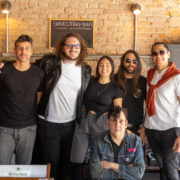Rapper Kayode stands out as a nominee for the 2023 Latin Grammy, one of the biggest music awards in the world, with his impactful music video “Podcast/Pedra da Memória” in the Best Short Version Music Video category. Directed by Gabriel Avelar and Beto Galloni, and produced by Yalla Recordings, the project brings to light urgent issues, addressing police repression and presenting real accounts from young black people who have lived through these experiences. Furthermore, the film makes reference to emblematic cases that marked the country, such as the tragic incident involving Genivaldo de Jesus Santos.
The results of the awards will be revealed on November 16, in Seville, Spain, promising to recognize the talents and voices that resonate in contemporary music. Kayode, born in Vila Morse, São Paulo, has followed a diverse musical journey, initially in funk and, since 2014, in rap, where he stands out for his authenticity and lyrics full of representation. His album “Flow da Pele”, released in 2022, was a significant milestone in his career, propelling him to new heights and consolidating his presence on the national scene.
Congratulations on your Latin Grammy nomination! How do you feel being recognized at one of the biggest music awards in the world?
Thanks. Not only me, but my entire team are excited about the nomination and are aware that it is the result of a lot of work and affection for our art.
The music video “Podcast/Pedra da Memória” addresses important social issues, such as police repression and violence against young black people. What message would you like to convey through this work?
The message is, in fact, a complaint. The short film tells something that I experienced when I came of age, and that continues to happen in the favelas of Brazil. Young black people are forged and unduly arrested, recognized by photo and video devices, without the chance of defense and treatment that should be the right of each and every citizen.
What was the creative process like for producing the music video? What were the main inspirations and challenges faced?
The creative process of the short was born in a very interesting exchange with the directors of Paladino, where they were willing to listen to part of my story and the way in which the songs relate to the facts. Despite the Protestant tone, the short is a form of tribute to all poor black mothers, who often have their children deprived of their freedom, when they do not give up their own lives. This becomes evident when we present a reinterpretation of Pietà, represented by Oya, who is worshiped as an Orixá with very strong maternal characteristics and traits.
The album “Flow da Pele” seems to have been an important milestone in your career. How do you see the evolution of your art since the release of this work?
The album’s central theme is the discovery of ancestral strength through rhythm, precisely because it was exactly the process I went through when creating the tracks. I discovered and developed artistic identity, characteristics and traits in my artistic expressions that I myself did not know. And it’s been a journey of a lot of work and evolution since then.
In addition to the Latin Grammy, the music video was also recognized in other awards. How do you believe this visibility impacts the national rap scene and independent music?
I believe that nominations and awards like the Grammys, being won by artists like me; organically and without gigantic numbers. It certainly shows that there are a lot of quality things being produced away from the spotlight, and that they deserve more attention and recognition.
You mentioned that art has space and is what moves music to evolve. How do you see the role of independent artists in innovating and diversifying the music industry?
It is difficult to demand or hold the artist responsible for changes in the music scene and market, understanding that music is a reflection of society, and the artist is part of society. For there to be some kind of change in the music scene and market, if it is necessary, it is also necessary for us to change as a society.
What was it like working with the Yalla Recordings team and the experience of developing a conceptual project? What do you think makes this project special and unique?
I believe that what has made the partnership between me and Yalla so great is the fact that we chose to work on my real life story, from my name to the smallest detail of the narrative. And of course, all the creative freedom that they have always guaranteed, but which is so difficult to find on other labels with bigger names.
His music is a mix of rhythms and strong messages. How do you balance musical diversity with the consistency of a powerful message in your lyrics?
The mix of rhythms and strong messages is the creation of my ancestors, it is here, not only in me but in all young black people and their diaspora. The album is exactly about the balance of these two elements. I call this balance Skin Flow.
Looking to the future, what are your next projects and what goals do you have for your music career?
I can say for sure which album will get a deluxe version with features and new songs. And we have some plans in the works. But I’m not able to size up the next steps. Flow da Pele is my first official studio album and has already earned us a Grammy nomination. Considering I’m just starting to warm up, it’s silly to try to predict the results.
Follow Kayode on Instagram





